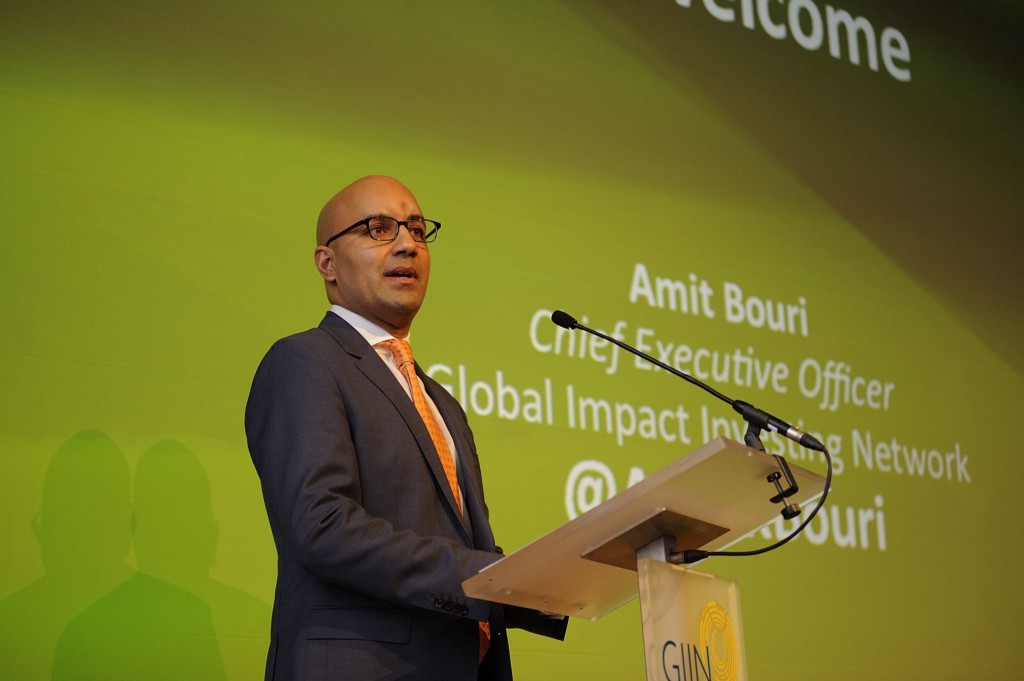The coronavirus crisis has laid bare issues of inequality that private investors – not just governments – must urgently address.
In a podcast interview with ImpactAlpha, the Global Impact Investing Network’s Amit Bouri said the large and growing impact investing marketplace that has developed in the past decade cannot be considered a success if the larger economic system is failing to address issues of inequality and climate change.
“As a result of this crisis, that conversation ramps up with a much greater degree of urgency,” said Bouri, who co-founded the GIIN in 2009 and stepped up at CEO in 2015. “We see the downsides of having an unequal society and we’ll also the impacts it has on our ability to make headway on addressing climate change.”
Bouri said the crisis represents “a real moment of leadership,” notwithstanding an inevitable pause in impact investment activity as funds and enterprises focus on health and safety and basic business continuity.
“Investors that do have capital to deploy, they want to be part of the response to the crisis, the recovery coming out of the crisis and ultimately investing in a more resilient system that can better weather the shocks coming out of the crisis.”
Three ways asset owners can shift mindsets, incentives and portfolio theory
Other highlights from the conversation:
Stabilization and liquidity. “Investors are thinking about how they can adjust terms and provide emergency financing, in the form of bridge loans and other capital. That is globally top of mind for impact investors.”
Market rate. “What is the world we’re trying to invest in? We’re coming out of a 10-year recovery from the great financial crisis. We’ve had a boom in the stock market and GDP growth, but an incredibly uneven recovery that has exacerbated inequality and has not done enough to address climate change… There will be a lot of soul-seaching about what is ‘market rate.’”
Catalytic capital. “The significance of those investors deploying catalytic capital will grow massively in this time of crisis, rolling through the response into the recovery and beyond… The need to use catalytic capital to leverage in more commercial capital will be incredibly important. This is a real leadership moment for catalytic capital investors.”
Climate finance. Wind farms and solar project still need access to capital, Bouri said. “In a capital crunch, those businesses will have the same challenges we have in the rest of the economy. For impact investors, there will be a lot of work to do to shape the way we come out of this crisis.”
Social equity. The crisis has spurred a much broader discussion of worker rights and who really drives the economy and keeps it going, with fundamental debates about sick leave, health care, family medical leave and even universal basic income. “There have been advocates working on those issues for years. All of a sudden those issues are brought to the forefront in a very powerful, visceral way.”
Mass movement. “One thing we overlook, and underutilize is the role of pension funds and retirement accounts. We have the capital of ordinary folks that’s pooled together in these massive pools that have a huge amount of influence. We will often focus on the professional investment staff of a pension fund and we don’t do as good a job engaging the actual pensioners themselves. There will be a focus on how we engage a much broader set of folks who are not professional investors but who absolutely want their money invested in a better world and in their future generations and actually have influence over a tremendous amount of capital.”
Setting the Table: How government policy can help mobilize private capital for public good
Catch up on all of ImpactAlpha’s Returns on Investment podcasts, and subscribe, on iTunes, Spotify, SoundCloud or Stitcher.












